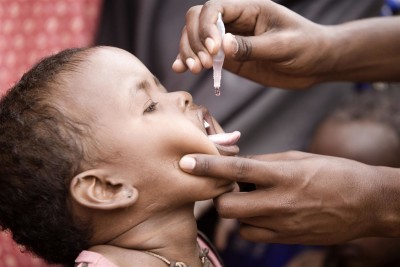
Despite recording no single new case of polio infection in the past 18 months, Nigeria remains a country blighted by the disease and a possible source of infection to the rest of the world. Until she meets the requirements for polio-free certification, the country will remain classified among only three countries that constantly transmit the child-killing paralytic disease. The Nigerian authorities must continue to shut out polio for three years at a stretch to be certified polio-free.
But achieving that target remains a Herculean task in the face of difficulties in getting polio vaccines through to every child that needs it, especially in the North-East where villages still remain under the firm grip of Boko Haram terrorists. For now, the Minister of Health, Isaac Adewole, says that no fewer than 100,000 children have been trapped in the Boko Haram enclave and cannot be covered under the current immunisation programme.
Polio, also known as poliomyelitis or infantile paralysis, is defined by the World Health Organisation as a highly infectious viral disease common among children under the age of five. When the poliovirus invades the nervous system, it can cause irreversible paralysis in a matter of hours. The virus, which enters an infected child’s body through the mouth and multiplies in the intestine, is shed through faeces into the environment.
In a situation of poor hygiene, it spreads rapidly through the community by means of person-to-person contact. Apart from the faecal-oral route, it can also be spread through contaminated water or food. “If a sufficient number of children are fully immunised against polio, the virus is unable to find susceptible children to infect and dies out,” the global agency says.
Although polio has no cure, it can be treated for the amelioration of the symptoms, which include fever, fatigue, headache, vomiting, stiffness in the neck and pain in the limbs. In over 90 per cent of cases, no symptoms or very mild symptoms occur, which usually go unnoticed. The only way to prevent infection of children is through vaccination. Through this mode, the world has been able to reduce cases of polio by 99 per cent. Nigeria, Pakistan and Afghanistan are the remaining polio-endemic countries in the world; they have failed to eradicate the disease more than 30 years after the World Health Assembly adopted a resolution to eradicate polio by 2000.
Before the introduction of polio vaccines in 1955, polio paralysed and killed thousands of people every year. Although many victims recover and become immune for life, MedlinePlus, an online medical information site, said polio could result in death through paralysis of the muscles used for breathing. Only one in 200 cases result in paralysis but the 200 cases can continue to spread the infection. It is a measure of the progress made so far that the world has been able to move from the situation of four decades ago when 1,000 children were reportedly paralysed every day.
Nigeria’s bid to rid her territory of the virus is complicated by the fact that it is tied to success in the ongoing asymmetric war against Boko Haram. Like other Islamic fundamentalist groups across the world, Boko Haram does not believe in vaccination of children. Therefore, until the terror group is wiped out and normalcy is restored to the states still being tormented by the terrorists, it is doubtful if the ultimate target of eradicating the disease in Nigeria can be achieved.
Even before the advent of Boko Haram, some parts of the country had resisted vaccination, citing conspiracy by the government to spread infertility among their people. The same issue is a factor in the inability of Pakistan to eradicate the disease. In some instances, vaccinators in both countries have been attacked and killed. In Kano State five years ago, nine vaccinators were shot dead in the course of duty. This led to suspension of immunisation work and the worsening of the situation. Before then, there was a vaccination boycott that lasted from February 2003 to July 2004.
However, despite all the odds, Nigeria came tantalisingly close to success in polio eradication before the progress was interrupted by an outbreak at Gwoza and Jere local government areas, both in Borno State, in August 2016. By the time of interruption, Nigeria had already completed two of the required three years without any incident of polio outbreak, and would have joined India, as the last countries to exit the polio group.
The Nigerian health authorities have a responsibility to enlighten the people about the need to have their children immunised, not only against polio but the other known diseases that kill infants. By now, parents should be voluntarily seeking vaccination for their children and not wait until they are forced to do so. Efforts should also be made to improve sanitation as open defecation contributes considerably to the spread of the infection.
It is often said that as long as there is a single case of polio anywhere in the world, no child is safe. This was confirmed last week when an outbreak was reported in Papua New Guinea, a country that has not had a case of wild poliovirus since 1996 and was certified polio-free in 2000. It has not yet been established which country the infection came from; but the strain found in Yemen and Indonesia, earlier declared polio-free, has been genetically linked to those originating in Nigeria.
With just 20 cases reported globally last year and 15 so far this year, the world is getting increasingly close to eradicating polio. This will bring to three, the diseases that have been successfully eradicated, the others being smallpox and rinderpest, a highly contagious viral disease of ruminant animals, especially cattle. But, no matter the closeness to achieving a polio-free Nigeria, if Boko Haram is not put to rout, it will be an exercise in futility.
END

Be the first to comment